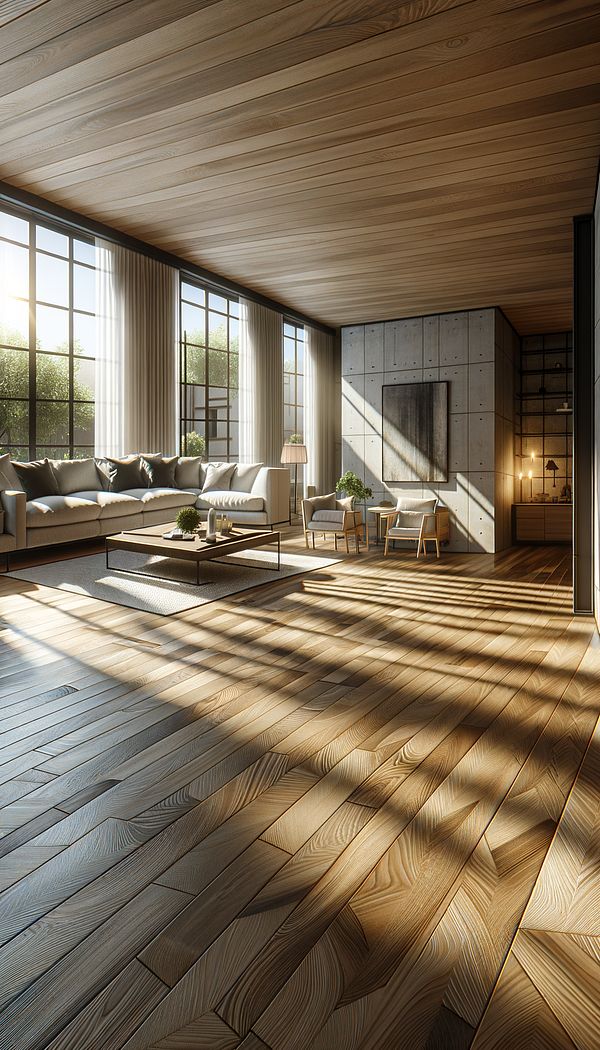What is Engineered Hardwood?
Engineered hardwood is a type of flooring made from multiple layers of wood, including a real hardwood top layer.
Description
Engineered hardwood is a versatile and durable flooring option that combines the beauty of real hardwood with the stability of layered construction. Unlike solid hardwood, engineered hardwood is made by bonding together multiple layers of wood. The top layer, known as the veneer, is made from real hardwood, giving the floor its natural and elegant appearance. This veneer layer is supported by several layers of plywood or high-density fiberboard (HDF), which are laid in opposite directions to increase stability and resistance to moisture and temperature changes.
This construction makes engineered hardwood less susceptible to warping and expanding than solid hardwood, making it suitable for a variety of climates and spaces, including those prone to moisture, such as basements and kitchens. Moreover, engineered hardwood can be installed over most subfloors and can be used with underfloor heating systems, offering flexibility in flooring choices.
Engineered hardwood floors come in a wide range of wood types, colors, and finishes, allowing homeowners and designers to achieve their desired aesthetic without compromising on durability. Moreover, the installation process of engineered hardwood can be simpler and more cost-effective than that of traditional hardwood, making it an appealing option for both new constructions and renovation projects.
Usage
Engineered hardwood is often chosen for its aesthetic appeal, durability, and versatility. It is commonly used in residential and commercial spaces, including living rooms, bedrooms, offices, and retail environments. Its compatibility with underfloor heating systems also makes it a popular choice for modern, eco-friendly homes seeking energy-efficient heating solutions.
FAQs
-
Can engineered hardwood be refinished?
Yes, high-quality engineered hardwood can be refinished, but the number of times it can be done depends on the thickness of the top veneer layer. Thicker veneer layers allow for more refinishing options.
-
Is engineered hardwood more expensive than laminate flooring?
Engineered hardwood is generally more expensive than laminate flooring because it features a real hardwood top layer, whereas laminate has a photographic layer that mimics the appearance of wood.
-
How long does engineered hardwood last?
With proper care and maintenance, engineered hardwood floors can last anywhere from 20 to 100 years, depending on the quality of the material and the thickness of the top veneer layer.
-
Is engineered hardwood suitable for kitchens?
Yes, engineered hardwood is suitable for kitchens due to its resistance to moisture and temperature fluctuations. However, spills should be cleaned promptly to avoid water damage.
-
Can engineered hardwood be installed over concrete?
Yes, engineered hardwood can be directly installed over concrete subfloors, making it a versatile choice for various types of buildings and renovation projects.
Practical Application
When considering engineered hardwood for your home or project, it's important to select a product with a sufficiently thick top veneer layer if you anticipate the need for refinishing in the future. Also, consider the specific conditions of your space, such as moisture levels and temperature fluctuations, to ensure the best performance and longevity of your flooring. Regular cleaning and the use of protective pads under furniture can help maintain the beauty and integrity of engineered hardwood floors.
-
Decorating Principles & Elements330 articles
-
Materials & Textiles360 articles
-
Construction & Building86 articles
-
Flooring & Carpets48 articles
-
Sustainability & Eco-Friendly Design69 articles
-
Boho ChicBoho Chic is a design style that combines bohemian and chic elements to create an eclectic, worldly, and layered interior.
-
LoveseatA loveseat is a small sofa designed to comfortably seat two people.
-
SlubSlub refers to a characteristic of fabric that is marked by thick, nubby areas created by slight knots.
-
Steam BendingSteam bending is a woodworking process where steam is used to soften wood, making it pliable enough to be easily shaped into curves.
-
BackdropIn interior design, a backdrop refers to any surface or feature behind a key area of focus that sets the stage or enhances the aesthetic appeal of the space.
